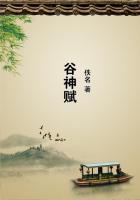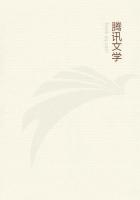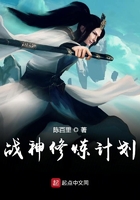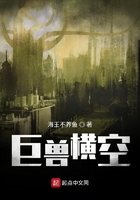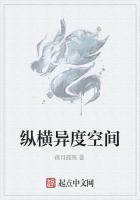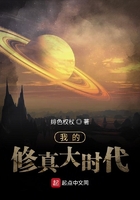They now placed before him their best roots, fish, and syrup, after which he attempted to purchase a sea-otter skin with some red beads which he happened to have about him; but they declined trading, as they valued none except blue or white beads. He therefore bought nothing but a little berry-bread and a few roots, in exchange for fish-hooks, and then set out to return by the same route he had come.
He was accompanied by Cuskalah and his brother as far as the third creek, and then proceeded to the camp through a heavy rain.
The whole party had been occupied during his absence in cutting down trees to make huts, and in hunting."
This was the occupation of all hands for several days, notwithstanding the discomfort of the continual downpour.
Many of the men were ill from the effects of sleeping and living so constantly in water. Under date of December 12, the journal has this entry:--"We continued to work in the rain at our houses. In the evening there arrived two canoes of Clatsops, among whom was a principal chief, called Comowol. We gave him a medal and treated his companions with great attention; after which we began to bargain for a small sea-otter skin, some wappatoo-roots, and another species of root called shanataque.
We readily perceived that they were close dealers, stickled much for trifles, and never closed the bargain until they thought they had the advantage.
The wappatoo is dear, as they themselves are obliged to give a high price for it to the Indians above. Blue beads are the articles most in request; the white occupy the next place in their estimation; but they do not value much those of any other color. We succeeded at last in purchasing their whole cargo for a few fish-hooks and a small sack of Indian tobacco, which we had received from the Shoshonees."
The winter camp was made up of seven huts, and, although it was not so carefully fortified as was the fort in the Mandan country (during the previous winter), it was so arranged that intruders could be kept out when necessary. For the roofs of these shelters they were provided with "shakes" split out from a species of pine which they called "balsam pine," and which gave them boards, or puncheons, or shakes, ten feet long and two feet wide, and not more than an inch and a half thick.
By the sixteenth of December their meat-house was finished, and their meat, so much of which had been spoiled for lack of proper care, was cut up in small pieces and hung under cover.
They had been told by the Indians that very little snow ever fell in that region, and the weather, although very, very wet, was mild and usually free from frost.
They did have severe hailstorms and a few flurries of snow in December but the rain was a continual cause of discomfort.
Of the trading habits of the Clatsops the journal has this to say:--"Three Indians came in a canoe with mats, roots, and the berries of the sacacommis. These people proceed with a dexterity and finesse in their bargains which, if they have not learned it from their foreign visitors, may show how nearly allied is the cunning of savages to the little arts of traffic.
They begin by asking double or treble the value of what they have to sell, and lower their demand in proportion to the greater or less degree of ardor or knowledge of the purchaser, who, with all his management, is not able to procure the article for less than its real value, which the Indians perfectly understand.
Our chief medium of trade consists of blue and white beads, files,--with which they sharpen their tools,--fish-hooks, and tobacco; but of all these articles blue beads and tobacco are the most esteemed."
But, although their surroundings were not of a sort to make one very jolly, when Christmas came they observed the day as well as they could.
Here is what the journal says of the holiday:--"We were awaked at daylight by a discharge of firearms, which was followed by a song from the men, as a compliment to us on the return of Christmas, which we have always been accustomed to observe as a day of rejoicing.
After breakfast we divided our remaining stock of tobacco, which amounted to twelve carrots [hands], into two parts; one of which we distributed among such of the party as make use of it, ****** a present of a handkerchief to the others.
The remainder of the day was passed in good spirits, though there was nothing in our situation to excite much gayety.
The rain confined us to the house, and our only luxuries in honor of the season were some poor elk, so much spoiled that we ate it through sheer necessity, a few roots, and some spoiled pounded fish.
"The next day brought a continuation of rain, accompanied with thunder, and a high wind from the southeast. We were therefore obliged to still remain in our huts, and endeavored to dry our wet articles before the fire.
The fleas, which annoyed us near the portage of the Great Falls, have taken such possession of our clothes that we are obliged to have a regular search every day through our blankets as a necessary preliminary to sleeping at night. These animals, indeed, are so numerous that they are almost a calamity to the Indians of this country.
When they have once obtained the mastery of any house it is impossible to expel them, and the Indians have frequently different houses, to which they resort occasionally when the fleas have rendered their permanent residence intolerable; yet, in spite of these precautions, every Indian is constantly attended by multitudes of them, and no one comes into our house without leaving behind him swarms of these tormenting insects."
Although the condition of the exploring party was low, the men did not require very much to put them in good spirits.
The important and happy event of finishing their fort and the noting of good weather are thus set forth in the journal under date of December 30:--"Toward evening the hunters brought in four elk [which Drewyer had killed], and after a long course of abstinence and miserable diet, we had a most sumptuous supper of elk's tongues and marrow.

